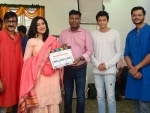April 19, 2024 23:55 (IST)

KIFF: Asha Jaoaar Majhe - A Path-breaking Film
Kolkata, Nov 16 (IBNS): Asha Jaoaar Majhe or Labour of Love is the sole Indian entry in the Cinema International section of the 20th KIFF. It marks several firsts both as an Indian film as well as a debut film by its director Aditya Vikram Sengupta. Labour of Love is a path-breaking film because it features two characters, both young and both Bengali living in contemporary Kolkata and also because the film strips itself of dialogue and takes advantage of silence.
They are a working couple but the director has refrained from labeling them with proper names. Yet, over the film, the two acquire distinctly individual identities of their own, separately and together. The film uses silence as its main strategy, character and subject underscoring the significance of how visuals can tell a story without using words at all. The silence is punctured with ambient sounds such as old songs floating across into the lives of the couple, a music teacher teaching Rabindra Sangeet to a girl who sings off-note quite often, hawkers' crying their wares on the streets below, all captured beyond the visual frame of the film.
"My background is actually design. I studied Graphic Design at the National Institute of Design and spent all my free time making live-action and animation films. I worked with channel [v] as a promo director for 3 years and then quit to work on my own projects. I started painting and exhibiting my art works and eventually started freelancing as an ad filmmaker and animator to earn a living," says Aditya Vikram Sengupta. He adds, "I decided to make Labour Of Love early last year as I always knew that films would allow me to combine my different interests…and that was exciting. The only challenge I faced was trying to find a producer to support the project. But I was determined to make the film and I had to make it happen. We managed to put the resources together, found amazing people to collaborate with and that’s how the film was made."
The wife (Basabdutta Chatterjee) works in a bag factory and lists the packaged bags ready for disposal to buyers. When she is on day shift, the husband (Rittwik Chakraborty) keeps himself busy in household chores - washing, cooking, putting the clothes out to dry till he readies himself to go to work in a printing press. When he is on day shift, the wife takes over. Through the film, they are never shown together except in the climax which takes us on a surrealistic journey with the young couple who are together for some time when, perhaps, either their holidays coincide or they have time for brief moments of togetherness very precious to them and they treat these moments with the happiness they alone can.
The visual narrative is occasionally broken by graphics that talk about unemployment, rising inflation and recession across the financial scenario. These graphics must be taken as the backdrop of the couple's love story throwing forth the message that happiness is a state of mind and those who wish to take advantage of small fragments of time, can an do extract that happiness like drops of precious diamonds denied to them for reasons of pure survival. Unless the viewer reads the film along with the graphics, the visuals alone might not make much sense.
The camera is very very slow, filled with panning shots that as if incidentally focus on apparently minor details such as the husband soaking the clothes, churning up the soap in the bucket, going to the market, buying fish, hanging clothes up to dry, taking them off when dry, packing his wife's tiffin and so on. In the same way, the wife engages in household chores when the husband is at work. This symbiosis in a husband-wife relationship is established (a) minus the two meeting at all, almost and (b) minus the normal dialogue used in films - mainstream and off-mainstream.
The ambient sound design by Anish John is stunning, and can easily function as a model lesson on how sound can and sometimes, ought to be designed to bring out the richness and beauty of the visuals. The climax is shot in Black-and-White which returns to colour when the film returns to ground reality, the wife preparing to go out to work, completing the circular motion bringing it back to where the film began.
“The decision to make the film without dialogue was not a designed thing. It was organic and evolved as we, as a team, got increasingly involved with the film during making it. There was a sequence with dialogue but the film developed a life of its own, stripping the need for dialogue and we felt we should not disturb it in any way,” says Aditya Vikram who has made the film on a shoe-string budget produced by his wife Jonaki Bhattacharya under the banner of For Films. “Later, Sanjai Shah who produced Miss Lovely stepped after the first edit stage. “Sanjay was working with NFDC and he extended help with the sales, distribution and film festival participation strategies,” he sums up. Aditya Vikram edited the film himself and also is co-cinematographer.
Aditya Vikram SenGupta was named the Best director in Venice Days, an independent sidebar of the Venice International Film Festival some time back. It has also travelled to London and Busan. It received a standing ovation after the screening at Nandan I.
(Reporting by Shoma A. Chatterji)
Support Our Journalism
We cannot do without you.. your contribution supports unbiased journalism
IBNS is not driven by any ism- not wokeism, not racism, not skewed secularism, not hyper right-wing or left liberal ideals, nor by any hardline religious beliefs or hyper nationalism. We want to serve you good old objective news, as they are. We do not judge or preach. We let people decide for themselves. We only try to present factual and well-sourced news.
Support objective journalism for a small contribution.
Latest Headlines
Sai Pallavi's old video dancing to 'Sheila Ki Jawani' goes viral Fri, Apr 19 2024
Rajinikanth, Kamal Haasan, Dhanush cast their votes in Chennai as Lok Sabha polls begin Fri, Apr 19 2024
Malayalam film Varshangalkku Shesham crosses Rs. 50 cr in box office Thu, Apr 18 2024
Has Chiranjeevi denied taking body double for Vishwambhara? Tue, Apr 16 2024






